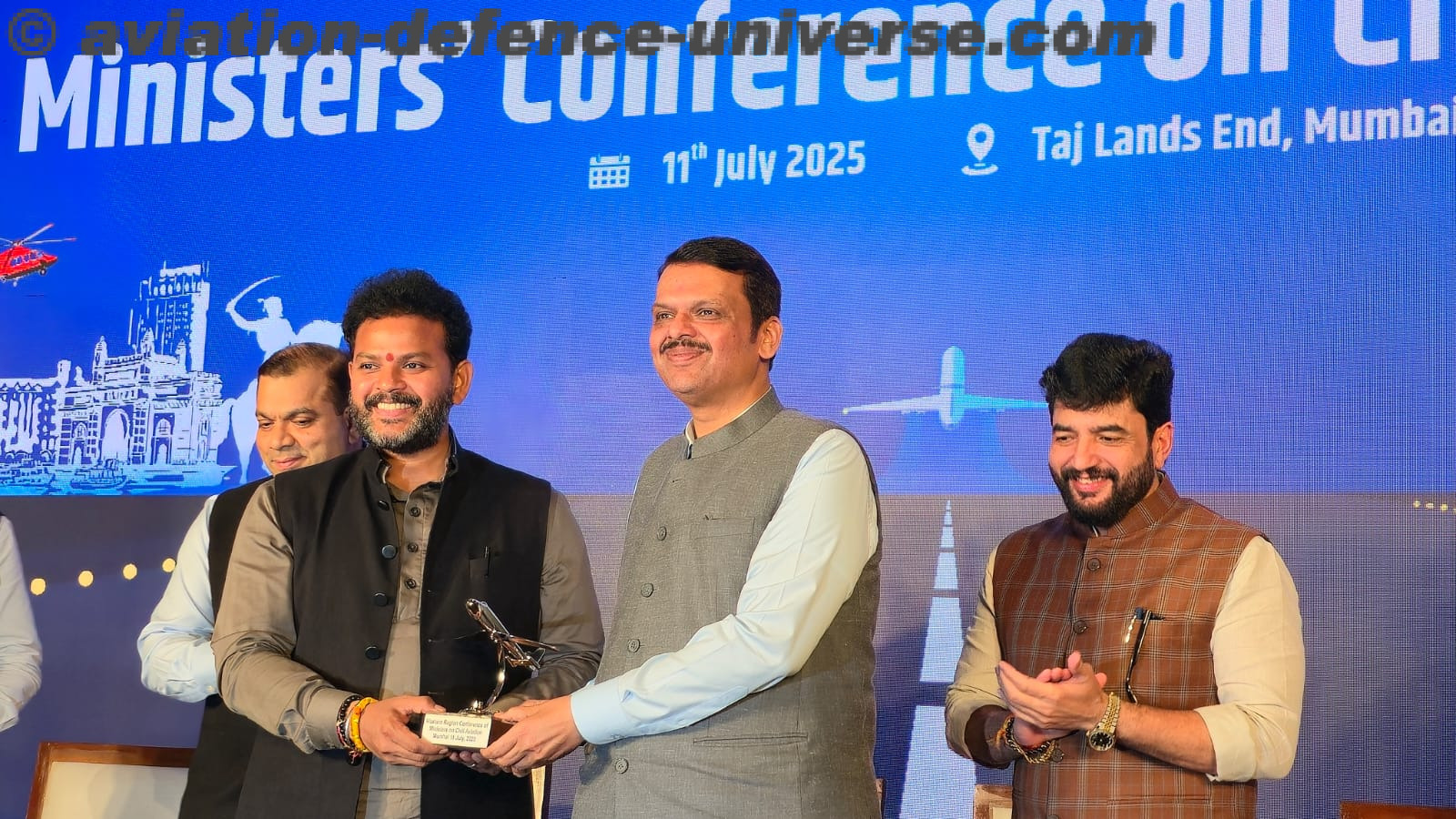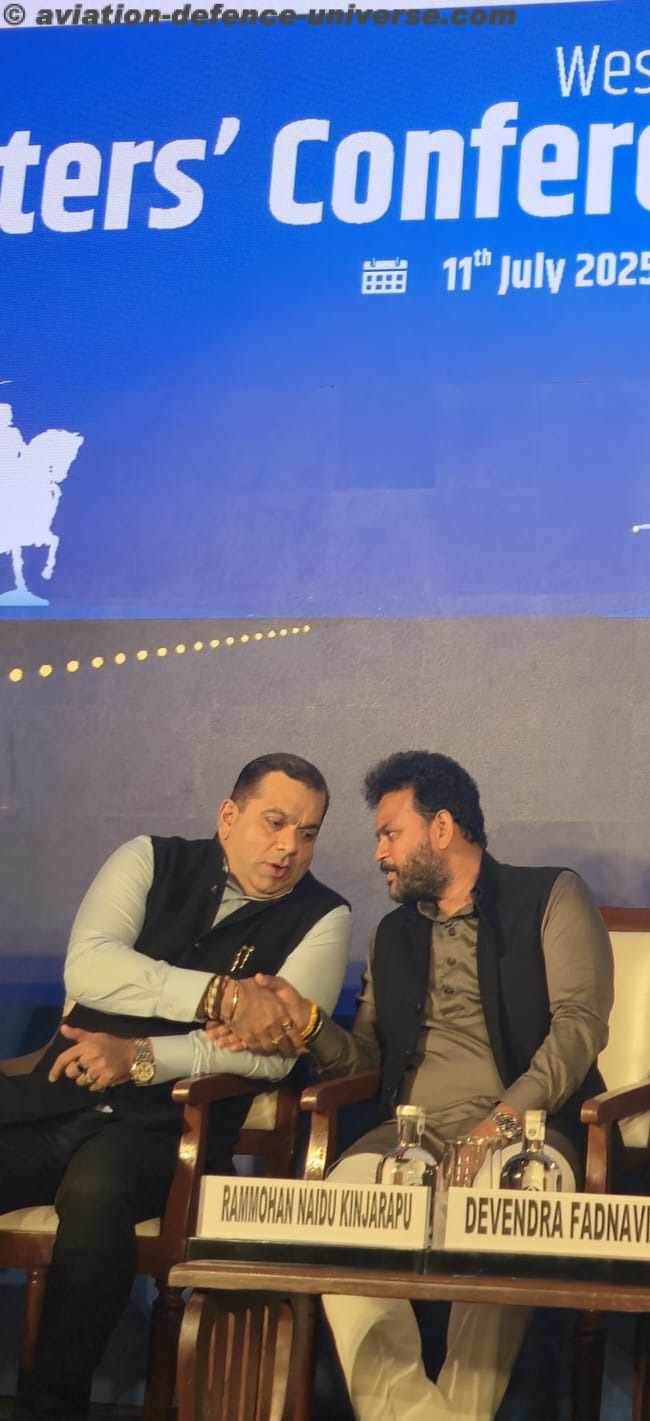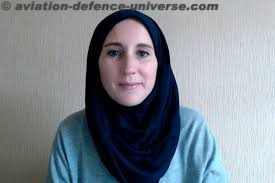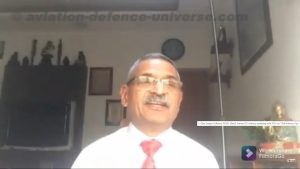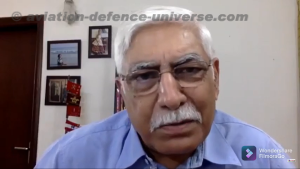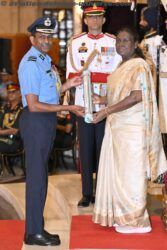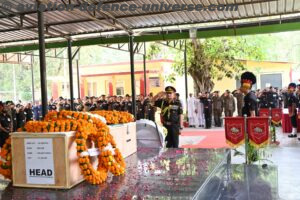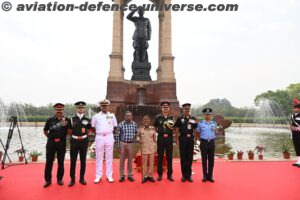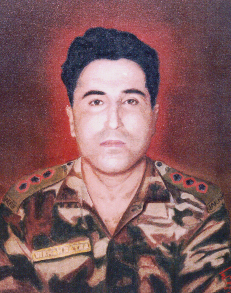
New Delhi. 27 October 2021. “I’m absolutely fine. Don’t you worry” – last words of the valiant son Captain Vikram Batra ,PVC to his Mother and “I’ll either come back after raising the Indian flag in victory or return wrapped in it. But I’ll come back for sure,” to his fiancée. And as was destined , Captain Vikram Batra, 13 Jammu and Kashmir Rifle was awarded the Param Vir Chakra, India’s highest military honour on 15 August 1999, the 52nd anniversary of India’s independence, posthumously going down in the annals of India’s history and his father G.L. Batra received the honour for his deceased son.
Batra joined the Indian Military Academy (IMA) at Dehradun in June 1996 in the Manekshaw Battalion. After completing his 19-month training course, he graduated from the IMA on 6 December 1997 and was commissioned as a lieutenant into the 13th battalion, Jammu and Kashmir Rifles (13 JAK RIF). After commissioning, he was sent to the regimental centre in Jabalpur, Madhya Pradesh for further training. The training lasted one month from December 1997 to the end of January 1998.
On completion of this training, he was posted to Sopore, Baramulla district, Jammu and Kashmir, an area with significant militant activity. In mid-March 1998, he was sent to the Infantry School at Mhow, Madhya Pradesh, for the Young Officer’s Course. This training lasted five months until September 1998. Following the completion of the course and being awarded alpha grading, he rejoined his battalion in Sopore in October 1998.
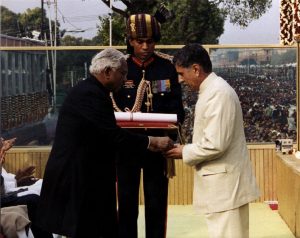
During his posting in Sopore, Batra had several encounters with militants. In one of those encounters when Batra was leading an ambush with his platoon into an area of dense forest, he had a miraculous escape when a bullet fired by a militant grazed his shoulder and struck one of Batra’s men behind him, killing the soldier. Batra proceeded to order his men to nab the militants, and by morning all of the militants had been killed. Batra, however, was saddened, because he knew that the bullet was meant for him. “Didi, it was meant for me and I lost my man,” he had told his elder sister over the phone.
In January 1999, Batra was sent to attend the Commando Course at Belgaum, Karnataka where he excelled. The course lasted for two months and at the end of it, he was awarded the highest grading—the Instructor’s Grade.
In Operation Vijay his battalion 13 JAK RIF upon reaching the Mushkoh Valley, was placed under the command of 79 Mountain Brigade. The next assignment for the battalion was to capture Point 4875, a strategically important peak located in the Mushkoh Valley. Since the feature dominated the National Highway 1 completely from Dras to Matayan, it became imperative for the Indian Army to capture it. A stretch of 30–40 kilometres of the national highway was under direct observation of the enemy and from the peak, Pakistani artillery observers could easily see Indian gun positions, army camps and troop movement, and bring down effective artillery fire at will.
On the night of 6–7 July, the opposing forces were so close that besides exchanges of small arms fire, verbal exchanges continued throughout the night. It was at this stage that it became imperative for Indian troops to destroy this Pakistani post, located north of Point 4875, from where enemy fire was coming as otherwise the situation could get worse. At this juncture, the Indian troops detected an enemy presence on a long and narrow ledge, running north from Point 4875. On the ledge, the enemy were holding strong sangars echeloned one behind the other. Batra, who was still recovering from his own wounds he received in the battle of Point 5140, wanted to reach the top to rescue his fellow soldiers and carry out reconnaissance of the ledge where the enemy soldiers were.
Even though it was pitch dark when they had left at night, when they neared the top where the soldiers had to climb vertically, visibility was almost zero because of fog. Even worse, it began snowing as they advanced. En route to the top, Batra spotted a Pakistani machine gun position firing at the trapped Indian soldiers. Crouching, he moved toward the machine gun position, hiding behind rocks whenever possible. As he reached close to the enemy’s machine gun position he lobbed a grenade, destroying the machine gun position. “Follow me, boys,” he whispered in the dark, and they advanced to the next position. At 16,087 feet, even though they were struggling for breath and panting, this did not stop them and they kept advancing non-stop. Before first light on 7 July, the troops succeeded in knocking out two more enemy machine guns, however, firing from the ledge continued. Batra’s platoon soon reached the ledge, though by this time it was broad daylight.
Batra, accompanied by Sub. Raghunath Singh and Maj. Bhat, his artillery observation officer, took out a patrol to recce a route to reinforce Nagappa from a flank. Batra located the position of the enemy sangar on the ledge from which enemy machine guns were holding up the advance of his company. At this juncture, Batra, realising that there was no way from the left or right, decided to make a direct daylight frontal assault. At great personal risk and under heavy fire from enemy machine guns and grenade launchers, Batra moved forward, screaming the battle cry of his regiment, Durga mata ki jai, and charged the sangar firing incessantly from his AK-47. He sustained grievous injuries in the process, yet he continued his charge, with supporting fire from the rest of the patrol, and reached the very narrow entrance of the sangar. Taking the enemy by complete surprise, he killed 5 Pakistani soldiers in a close combat.[81][82][83][84][85] “There was a time he grappled with a Pakistani soldier, punching him in the nose. As soon as he fell, Batra plunged his bayonet into the fallen soldier’s stomach. But another enemy soldier caught him from behind. He, too, was done to death after being thrown off the back by Batra, the ferocious. All hell broke loose. It was utter chaos,” a JAK RIF soldier, who accompanied him in the attack, said. The attack resulted in the deaths of seven Pakistani soldiers and the Indians gained a foothold on the ledge. Taken by surprise by this ferocious attack, the Pakistanis started retreating. Batra and his men had gained the upper hand.However, there was still an enemy machine gun nest in action on that ledge that had to be silenced. Four Pakistani soldiers including a junior commissioned officer (JCO), who was guiding the fire on the Indian soldiers fighting outside, were manning the machine gun nest. An enraged Batra quickly charged forward alone, killing all four members of the crew.
Suddenly, Batra realised that one of his men had been shot. Turning toward Sub. Raghunath Singh, who was positioned behind a nearby boulder, maintaining an iron grip on his AK-47, Batra shouted above the din of flying bullets: “Aap aur main usko evacuate karenge,” (We will evacuate him, you and I). With bullets flying around him, he pushed Singh toward the safer side and placed himself between Singh and the enemy, saying: “You have a family and children to go back to, I’m not even married. Main sar ki taraf rahunga aur aap paanv uthayenge” (I will take the head and you take his feet).[86] Batra courageously exposed himself to enemy fire to drag the injured soldier to safety, and in the process was shot in the chest by an enemy sniper from very close range and a split-second later, by a splinter from an RPG which hit him in the head. Batra collapsed next to the injured soldier, succumbing to his fatal wounds.
Like a true leader Captain Vikram Batra, lead from the front, knew of both the importance and danger of his mission. With his exemplary courage and his dare devil attitude his team led to the capture of Pt 4875 thereby giving the biggest jolt to the enemy. Generations of Indian Army soldiers will remember not only his supreme sacrifice but lessons of leadership he left behind.
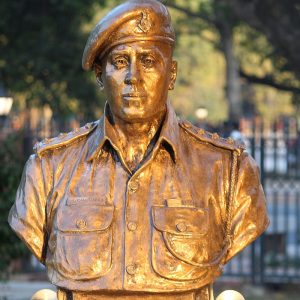
CITATION
CAPTAIN VIKRAM BATRA
13 JAMMU AND KASHMIR RIFLES (IC 57556)
During ‘Operation Vijay’, on 20 June 1999, Captain Vikram Batra, Commander Delta Company was tasked to attack Point 5140. Captain Batra with his company skirted around the feature from the East and maintaining surprise reached within assaulting distance of the enemy. Captain Batra reorganised his column and motivated his men to physically assault the enemy positions. Leading from the front, he in a daredevil assault, pounced on the enemy and killed four of them in a hand-to hand fight. On 7 July 1999, in another operation in the area Pt 4875, his company was tasked to clear a narrow feature with sharp cuttings on either side and heavily fortified enemy defences that covered the only approach to it. For speedy operation, Captain Batra assaulted the enemy position along a narrow ridge and engaged the enemy in a fierce hand –to-hand fight and killed five enemy soldiers at point blank range. Despite sustaining grave injuries, he crawled towards the enemy and hurled grenades clearing the position with utter disregard to his personal safety, leading from the front, he rallied his men and pressed on the attack and achieved a near impossible military task in the face of heavy enemy fire. The officer, however, succumbed to his injuries. Inspired by his daredevil act, his troops fell upon the enemy with vengeance, annihilated them and captured Point 4875.
Captain Vikram Batra, thus, displayed the most conspicuous personal bravery and leadership of the highest order in the face of the enemy and made the supreme sacrifice in the highest traditions of the Indian Army.
Aviation & Defence Universe salutes Captain Vikram Batra for his valour and selfless service and the motherland for producing such a son.











